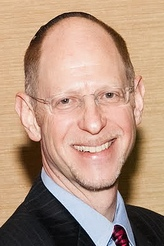“The world is thirsty, and getting thirstier.”
So announced David Goodtree, co-founder of the New England Water Innovation Network (NEWIN), as he opened the March 11 President’s Lecture in Razzo Hall at Clark University.

Goodtree spoke about global water scarcity and the conflicts that arise as nations go dry. He noted that the simple law of supply and demand dictates that water is a precious commodity: every one of the world’s seven billion people needs water to survive, but only 3 percent of the globe’s supply is fresh water.
Goodtree talked of how water scarcity led to hostility between India and Pakistan, how it is used as a tool of war by ISIS, and how it has bred the Tri-State “water war” among Alabama, Georgia and Florida. One in nine people worldwide does not have access to safe drinking water, and one and three has no access to proper septic facilities.
But technological advances combined with smart conservation are changing things in countries that once appeared to have intractable water shortages, he said. Goodtree cited the country of Singapore, which had relied on water piped in from neighboring Malaysia. Disagreements with Malaysia left Singapore committed to engineering its water independence. Today, thanks to sophisticated water technology — “water tech” in the industry’s parlance — that includes four separate taps for different kinds of water (including desalinated seawater), Singapore supplies its own water to his citizens.
The once parched Israel, too, has become an international model for addressing water woes. Goodtree said water issues have sparked border clashes with Jordan and Syria. An agreement to exchange water has eased hostilities with Jordan, and Israel has employed technology and policy to maximum benefit. Today the country is the world’s number one water recycler and reclaims 75 percent of all wastewater. Israel also has mastered the science of desalination and is number one in global desalination use.
As a leader in water tech, Israel, he said, is “bending the curve”: increasing supply and lowering demand for water.
Goodtree showed a number of slides illustrating the rise in water tech investment and development, especially in Massachusetts. He is a founder and co-organizer of the annual industry gathering known as SWIM, the Symposium on Water Innovation in Massachusetts. Goodtree also produced the “Massachusetts Water Industry Market Map” to showcase the industry’s depth and breadth. He led the Massachusetts Water Innovation Mission to Israel, and co-organized the “W.E.T. Revolution Competition” to highlight innovative water tech companies.
He said the progress in water technologies can put to rest the notion that the world has reached a point of no return, or “peak water,” but only if countries “choose to make it so.”
“We have the technologies to bring supply and demand into alignment,” he insisted. “The export of water tech sustains life and defuses conflict.”
Earlier in his presentation, Goodtree had asked for a show of hands as to whether people are optimistic or pessimistic about the future global water supply. The split was about fifty-fifty. At the conclusion of his talk, he repeated the question and again requested a show of hands. The outlook had lightened considerably, with the vast majority expressing optimism about the fate of the world’s water.


